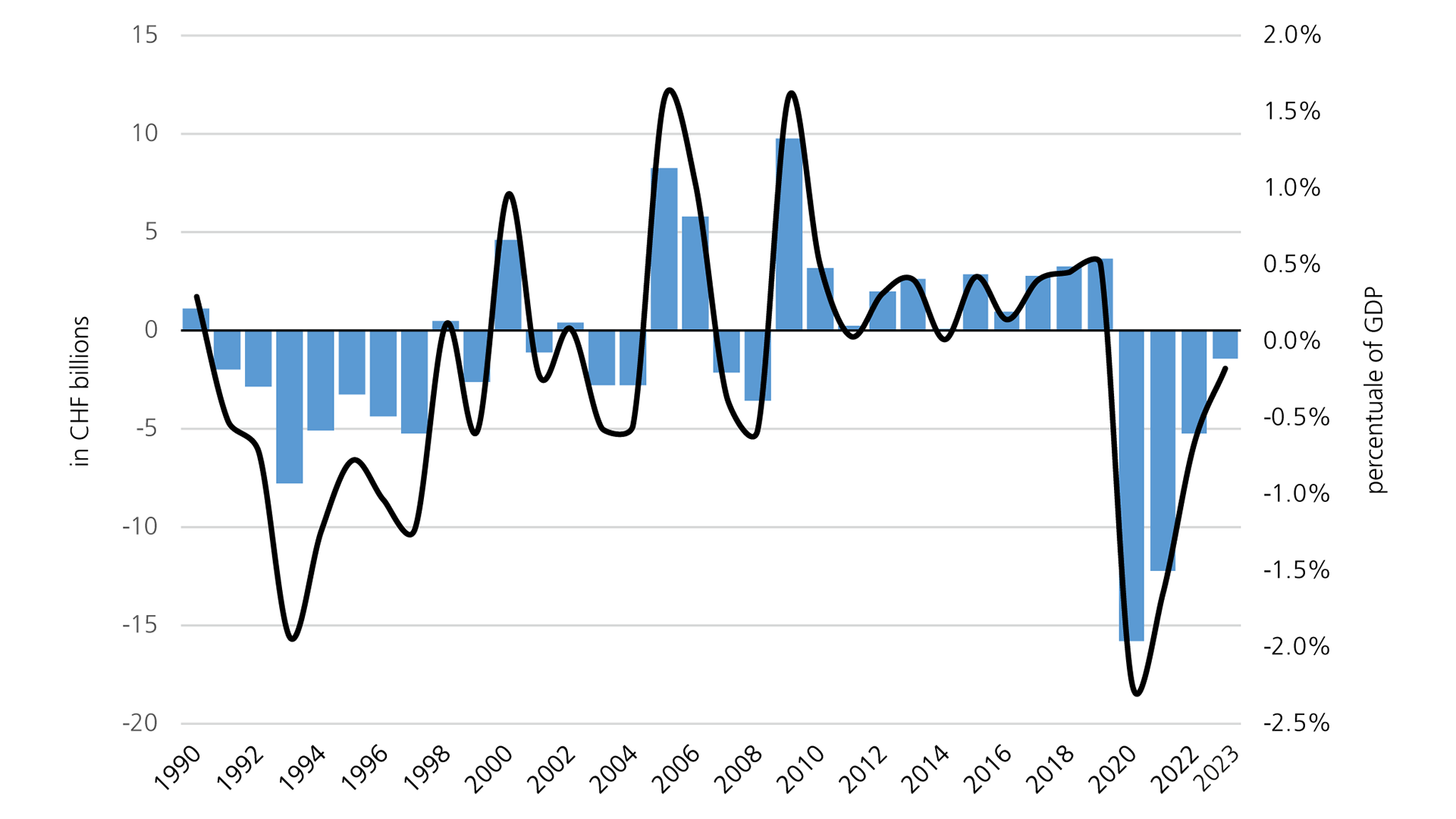What are the federal finances like in Switzerland? The most important facts and figures provide an overview of the federal budget and show the outlook for the federal finances for the years ahead.
Brief summary
The federal budget ended 2023 with a financing deficit of CHF 1.4 billion and was thus again unable to finance its expenditure using its own funds. The absence of a profit distribution from the Swiss National Bank (-2 bn) and the high payments required once again for contributions to the cantons for people from Ukraine seeking protection (1.1 bn) significantly impacted the result.
As part of the fiscal policy assessment in mid-February 2024, the course was set for a 2025 budget in compliance with the debt brake. To achieve this, an expected financing deficit of around CHF 2.5 billion had to be adjusted. The budgetary situation remains strained. An external group of experts has been mandated to review tasks and subsidies.

The chart shows the federal financial results from 1990 to 2023 in percent of GDP and in absolute figures. Large financing deficits, and thus significant downside outliers, are recorded for 1993, 2020 and 2021, but there are also large surpluses in the 2000s.
The Confederation ended 2023 with a financing deficit, just as in the two previous years. This was smaller than in recent years, due to the largely discontinued COVID-19 expenditure and the favourable trend of receipts. It totalled CHF 1.4 billion in 2023. The deficit was attributable in roughly equal measure to the ordinary and extraordinary budgets. At this stage of the economic cycle, a deficit of CHF 0.2 billion would have been permissible in the ordinary budget. Consequently, the ordinary financing deficit is largely structural in nature for the second year in succession (-0.4 bn).
Robust development of receipts in 2023
Federal receipts totalled CHF 79.6 billion in 2023. Despite the absence of a profit distribution from the SNB, they surged (+4.0 bn, or +5.2%). This growth was driven primarily by considerably higher receipts from direct federal tax (+3.1 bn) and withholding tax (+2.6 bn). In addition, value added tax increased by CHF 0.6 billion. In the case of direct federal tax, receipts from profit tax in particular rose sharply (+2.2 bn). The growth in withholding tax can be explained by the previous year's downward estimate adjustment (-1.9 bn).
The sale of RUAG International business arms resulted in extraordinary receipts of CHF 200 million. Moreover, receipts totalling CHF 201.3 million were generated in connection with the takeover of Credit Suisse by UBS (fees, risk premium and commitment premium).
Experience shows that the Confederation's total receipts develop in proportion to nominal GDP in the long term. In order to compare the trend of receipts with that of GDP, it is necessary to take account of any structural breaks such as tax rate changes, for example, the volatility of withholding tax, and extraordinary receipts. After adjusting for such factors, ordinary receipts increased by 4.9% in 2023, i.e. much more than nominal GDP, which grew by 2.3%. This was largely due to the surge in profit tax receipts.
Extraordinary payment requirements once again
Coming in at CHF 81.0 billion, federal expenditure remained at the previous year's level in 2023. Extraordinary payments were required for the fourth consecutive year, but they were significantly lower than in previous years, which were impacted by high COVID-19 expenditure. The only expenditure recognized as extraordinary was in connection with people from Ukraine seeking protection (1.1 bn). No extraordinary expenditure to deal with the COVID-19 pandemic was incurred in 2023 (2022: 2.4 bn); only ordinary expenditure of 195 million was required.
Ordinary expenditure grew by CHF 2.2 billion, or 2.8%, in 2023, and thus outstripped nominal GDP growth (+2.3%). In particular, the federal AHV contribution was CHF 405 million higher in 2023 than the previous year. More was also spent on premium reductions and supplementary benefits (+259 mn). Additional expenditure was likewise incurred in the area of migration (+405 mn), although expenditure for people from Ukraine seeking protection was recognised as extraordinary. Defence expenditure also increased by CHF 265 million. Finally, the Confederation spent CHF 310 million more on education and research than in 2022.
First addenda to the 2024 budget
For this year, Parliament approved a 2024 budget that is just about balanced. However, in its dispatch of 15 March 2024, the Federal Council already requested 11 supplementary credits totalling CHF 603.5 million from Parliament, in particular for reserve power plants, federal asylum centres and staff to process applications for asylum and protection status S. Actual expenditure is nevertheless unlikely to exceed the budgeted figure in 2024, due to the unutilised credits that arise annually.
On 14 August 2024, the Federal Council will report on the expected result for 2024 with the first extrapolation as at the end of June.
2025 budget and 2026-2028 financial plan
At the start of the year, the updated budget figures indicated a structural financing deficit of CHF 2.5 billion for 2025, caused mainly by rising expenditure on social insurance, premium reductions and the Armed Forces, and still high migration expenditure. In order to comply with the debt brake requirements, the Federal Council therefore decided on 24 January and 14 February 2024 to adjust the 2025 budget so as to achieve a debt brake-compliant budget for 2025. This includes a 1.4% linear reduction in loosely earmarked expenditure relative to the 2025-2027 financial plan.
In the medium term, the measures adopted are not sufficient to sustainably balance the federal budget. For this reason, on 8 March 2024, the Federal Council mandated an external group of experts to review tasks and subsidies and thereby restore the budget's ability to function in the long term.
Further information
Last modification 24.04.2024





